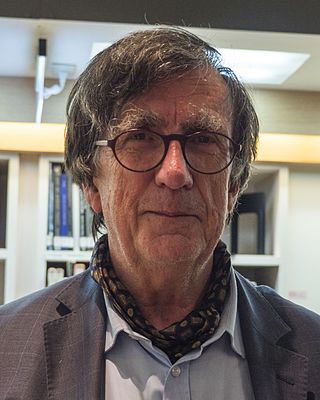Related Research Articles

Bruno Latour was a French philosopher, anthropologist and sociologist. He was especially known for his work in the field of science and technology studies (STS). After teaching at the École des Mines de Paris from 1982 to 2006, he became professor at Sciences Po Paris (2006–2017), where he was the scientific director of the Sciences Po Medialab. He retired from several university activities in 2017. He was also a Centennial Professor at the London School of Economics.
Actor–network theory (ANT) is a theoretical and methodological approach to social theory where everything in the social and natural worlds exists in constantly shifting networks of relationships. It posits that nothing exists outside those relationships. All the factors involved in a social situation are on the same level, and thus there are no external social forces beyond what and how the network participants interact at present. Thus, objects, ideas, processes, and any other relevant factors are seen as just as important in creating social situations as humans.

In the social sciences, social structure is the aggregate of patterned social arrangements in society that are both emergent from and determinant of the actions of individuals. Likewise, society is believed to be grouped into structurally related groups or sets of roles, with different functions, meanings, or purposes. Examples of social structure include family, religion, law, economy, and class. It contrasts with "social system", which refers to the parent structure in which these various structures are embedded. Thus, social structures significantly influence larger systems, such as economic systems, legal systems, political systems, cultural systems, etc. Social structure can also be said to be the framework upon which a society is established. It determines the norms and patterns of relations between the various institutions of the society.

Computational sociology is a branch of sociology that uses computationally intensive methods to analyze and model social phenomena. Using computer simulations, artificial intelligence, complex statistical methods, and analytic approaches like social network analysis, computational sociology develops and tests theories of complex social processes through bottom-up modeling of social interactions.
Theories of technological change and innovation attempt to explain the factors that shape technological innovation as well as the impact of technology on society and culture. Some of the most contemporary theories of technological change reject two of the previous views: the linear model of technological innovation and other, the technological determinism. To challenge the linear model, some of today's theories of technological change and innovation point to the history of technology, where they find evidence that technological innovation often gives rise to new scientific fields, and emphasizes the important role that social networks and cultural values play in creating and shaping technological artifacts. To challenge the so-called "technological determinism", today's theories of technological change emphasize the scope of the need of technical choice, which they find to be greater than most laypeople can realize; as scientists in philosophy of science, and further science and technology often like to say about this "It could have been different." For this reason, theorists who take these positions often argue that a greater public involvement in technological decision-making is desired.
In computer science, the scientific community metaphor is a metaphor used to aid understanding scientific communities. The first publications on the scientific community metaphor in 1981 and 1982 involved the development of a programming language named Ether that invoked procedural plans to process goals and assertions concurrently by dynamically creating new rules during program execution. Ether also addressed issues of conflict and contradiction with multiple sources of knowledge and multiple viewpoints.
In narrative theory, an actant in the actantial model of semiotic narrative analysis describes the roles different characters have in advancing a narrative. Bruno Latour writes,
An “actor” in [actor-network theory] is a semiotic definition -an actant-, that is, something that acts or to which activity is granted by others. It implies no special motivation of human individual actors, nor of humans in general. An actant can literally be anything provided it is granted to be the source of an action.
Problematization is a process of stripping away common or conventional understandings of a subject matter in order to gain new insights. This method can be applied to a term, writing, opinion, ideology, identity, or person. Practitioners consider the concrete or existential elements of these subjects. Analyzed as challenges (problems), practitioners may seek to transform the situations under study. It is a method of defamiliarization of common sense.
Michel Callon is a professor of sociology at the École des mines de Paris and member of the Centre de sociologie de l'innovation. He is an author in the field of Science and Technology Studies and one of the leading proponents of actor–network theory (ANT) with Bruno Latour.
The concept of an obligatory passage point (OPP) was developed by sociologist Michel Callon in a seminal contribution to actor–network theory: Callon, Michel (1986), "Elements of a sociology of translation: Domestication of the Scallops and the Fishermen of St Brieuc Bay". In John Law (Ed.), Power, Action and Belief: A New Sociology of Knowledge? London, Routledge: 196–233.
John Law, is a sociologist and science and technology studies scholar, currently on the Faculty of Social Sciences at the Open University. Law coined the term Actor-Network Theory (ANT) in 1992 when synthesising work done with colleagues at the Centre de Sociologie de l'Innovation.

In sociology, social psychology studies the relationship between the individual and society. Although studying many of the same substantive topics as its counterpart in the field of psychology, sociological social psychology places relatively more emphasis on the influence of social structure and culture on individual outcomes, such as personality, behavior, and one's position in social hierarchies. Researchers broadly focus on higher levels of analysis, directing attention mainly to groups and the arrangement of relationships among people. This subfield of sociology is broadly recognized as having three major perspectives: Symbolic interactionism, social structure and personality, and structural social psychology.
Ethnozoology is a field of study that explores the complex relationships between humans and animals in their environment. This discipline encompasses the classification and naming of various animal species, as well as the cultural knowledge and use of both wild and domesticated animals. Ethnozoology is a subdiscipline of ethnobiology, which also includes ethnobotany, the study of human-plant relationships. However, unlike ethnobotany, ethnozoology focuses specifically on human-animal relationships and the knowledge that humans have acquired about the animals in their surroundings.

Pecten maximus, common names the great scallop, king scallop, St James shell or escallop, is a northeast Atlantic species of scallop, an edible saltwater clam, a marine bivalve mollusc in the family Pectinidae. This is the type species of the genus. This species may be conspecific with Pecten jacobaeus, the pilgrim's scallop, which has a much more restricted distribution.
In science studies, the social process of blackboxing is based on the abstract notion of a black box. To cite Bruno Latour, blackboxing is "the way scientific and technical work is made invisible by its own success. When a machine runs efficiently, when a matter of fact is settled, one need focus only on its inputs and outputs and not on its internal complexity. Thus, paradoxically, the more science and technology succeed, the more opaque and obscure they become."
The term 'interessement' is French-English, and is synonymous with the word 'interposition'. It was first used by Michel Callon. It is used within the scientific tradition known as actor-network theory, in association with translation and the formation of networks. Various devices can be used in the interessement phase of a translation process, to strengthen the association between actors, and support the structure of the network.
Level of analysis is used in the social sciences to point to the location, size, or scale of a research target. It is distinct from unit of observation in that the former refers to a more or less integrated set of relationships while the latter refers to the distinct unit from which data have been or will be gathered. Together, the unit of observation and the level of analysis help define the population of a research enterprise.

A social network is a social structure made up of a set of social actors, sets of dyadic ties, and other social interactions between actors. The social network perspective provides a set of methods for analyzing the structure of whole social entities as well as a variety of theories explaining the patterns observed in these structures. The study of these structures uses social network analysis to identify local and global patterns, locate influential entities, and examine network dynamics.
A narrative network is a system that represents complex event sequences or characters’ interactions as depicted by a narrative text. Network science methodology offers an alternative way of analysing the patterns of relationships, composition and activities of events and actors studied in their own context. Network theory can contribute to the understanding of the structural properties of a text and the data contained in it. The meaning of the individual and the community in a narrative is conditional on their position in a system of social relationships reported by the author. Hence, a central problem when dealing with narratives is framing and organising the author's perspective of individual and collective connections to understand better the role of both the witness and its testimony as reflected by the text. However, the category of narrative network is in its formative, initial phase and as a consequence it is hard to view as a stable and defined notion in linguistics, and beyond sociology.
Madeleine Akrich is a French sociologist of technology. She served as the director of the Center for the Sociology of Innovation at Mines ParisTech from 2003 to 2013. She is known for developing actor–network theory (ANT) with Bruno Latour, Michel Callon, John Law and others.
References
- 1 2 3 Callon, M. & Latour, B., 1981. "Unscrewing the big Leviathan: how actors macro-structure reality and how sociologists help them to do so". In K. Knorr-Cetina & A. V. Cicourel, eds. Advances in social theory and methodology: Towards an integration of micro- and macro-sociologies. Boston: Routledge & Kegan Paul, pp. 277-303.
- ↑ Sismondo, Sergio (2009). An Introduction to Science and Technology Studies. John Wiley And Sons Ltd. pp. 81–92. ISBN 9781405187657.
- ↑ Serres, Michel (1974). Hermès III, la traduction. Éditions de Minuit. ISBN 9782707338761.
- ↑ Callon, Michel (1975). "L'Opération de traduction symbolique". Incidence des rapports sociaux sur le développement scientifique et technique– via CNRS.
- 1 2 3 4 Callon, M., 1984. "Some Elements of a Sociology of Translation: Domestication of the Scallops and the Fishermen of St Brieuc Bay". The Sociological Review. 32 (1_suppl): 196–233. doi:10.1111/j.1467-954X.1984.tb00113.x. ISSN 0038-0261.